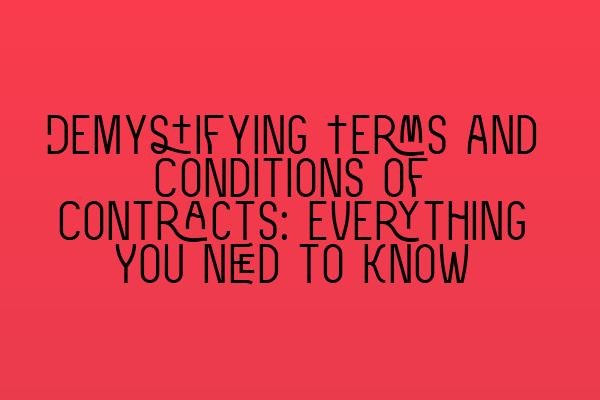Demystifying Terms and Conditions of Contracts: Everything You Need to Know
When it comes to legal matters, understanding the terms and conditions of contracts is essential. Whether you are a business owner, a freelancer, or even an individual entering into an agreement, having a clear grasp of contract terms is crucial to protect your rights and ensure a fair and binding agreement. In this blog post, we will demystify the world of contract terms and conditions, providing you with everything you need to know.
1. What are Terms and Conditions?
Terms and conditions, also known as T&Cs, are legally binding provisions that outline the rights, obligations, and responsibilities of the parties involved in a contract. These terms act as a roadmap, guiding the relationship between the parties and providing a framework for how the agreement will be executed.
2. Why are Terms and Conditions Important?
Terms and conditions serve several important purposes. Firstly, they establish the legal relationship between the parties, ensuring that all parties are on the same page regarding expectations and obligations. Secondly, T&Cs provide clarity and transparency, preventing misunderstandings and potential disputes down the line. Finally, terms and conditions protect the interests of all parties involved, providing remedies and recourse in case of a breach.
3. Key Components of Terms and Conditions
a. Offer and Acceptance: The terms and conditions should clearly state the offer made by one party and the acceptance by the other. This ensures that both parties are in mutual agreement before entering into the contract.
b. Payment Terms: The financial aspect of the contract should be clearly outlined, including payment deadlines, methods, and any penalties for late or missed payments.
c. Delivery and Performance: If your contract involves the provision of goods or services, it is essential to define the parameters for delivery and performance, including timelines, quality standards, and any warranties or guarantees.
d. Dispute Resolution: In the unfortunate event of a dispute, having a clear dispute resolution clause will help to resolve conflicts efficiently and effectively. This may include mediation, arbitration, or court proceedings.
e. Termination and Breach: It is essential to detail the circumstances under which the contract can be terminated and the consequences of a breach. This will provide clarity and protection for all parties.
4. How to Draft Effective Terms and Conditions
a. Seek Legal Advice: Contract law can be complex, and each agreement will have its unique considerations. Consulting a solicitor experienced in contract law will ensure that your terms and conditions are legally sound, protecting your interests.
b. Clear and Concise Language: Avoid using overly technical or convoluted language. Instead, aim to communicate your expectations and obligations in clear and straightforward terms. This will help all parties understand the contract’s requirements easily.
c. Tailor to Your Needs: Generic templates may not address your specific requirements. Ensure your terms and conditions are customized to reflect your business or personal needs accurately.
d. Review and Update Regularly: As laws and regulations change, it is crucial to review and update your terms and conditions regularly. This will ensure that your contract remains compliant and up to date with any legal changes.
In conclusion, understanding the terms and conditions of contracts is essential for anyone entering into a legal agreement. By demystifying contract terms, we hope to provide you with the knowledge necessary to protect your rights and ensure fair and binding contracts. For further preparation and assistance in navigating the world of SQE contract law, you may also find the following articles helpful:
– SQE 1 Practice Exam Questions
– SQE 1 Practice Mocks FLK1 FLK2
– SQE 2 Preparation Courses
– SQE 1 Preparation Courses
– SRA SQE Exam Dates
Remember, seeking professional legal advice is always recommended when drafting or reviewing complex legal contracts.
